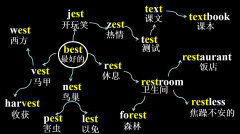2020南昌小学英语智能家教,奇速优课VIP卡1000个优课课程账号!
作者:未知 时间:2020-02-28 阅读:( )
1.人称代词
主格: I we you she he it they
宾格: me us you her him it them
形容词性物主代词:my our your her his its their
名词性物主代词: mine ours yours hers his its theirs
2.形容词和副词的比较
(1) 一般在形容词或副词后+er
older ,taller, longer, stronger
(2) 多音节词前+more
more interesting, etc.
(3) 双写最后一个字母,再+er
bigger fatter, etc.
(4) 把y变i,再+er
heavier, earlier
(5) 不规则变化:
well-better, much/many-more, etc.
3.可数词的复数形式
Most nouns + s abook –books
Nouns ending in aconsonant +y - y+ ies a story—stories
Nouns ending in s,sh, ch or x + es a glass—glasses a watch-watches
Nouns ending in o+s or +es a piano—pianos a mango—mangoes
Nouns ending in for fe - f or fe +ves a knife –knives a shelf-shelves
4.不可数名词(单复数不变)
bread, rice, water ,juice等。
5.缩略形式
I’m= I a, you’re = you are, she’s= she is, he’s = he is
it’s= it is, who’s =who is, can’t =can not, isn’t=is not等。
6.a/an
a book, a peach
an egg, an hour
7.Preposition
on, in ,in front of, between, next to, near, beside, at,behind.
表示时间: at six o’clock, at Christmas, at breakfast
on Monday, on 15th July, On National Day
in the evening, in December, in winter
8.基数词和序数词
one – first, two-second,twenty-twentieth
9.some/any
I have some toys in my bedroom.
Do you have any brothers or sisters?
10.be动词
(1) Basic form: am/are/is
(2) 肯定和否定句 I am(not) from London.
My eyes are(not) small.
My hair is(not) long.
(3)一般疑问句: Am I a Chniese? Yes, you are. No, you aren’t.
Are they American? Yes, they are. No,they aren’t.
Is the cat fat? Yes,it is. No, it isn’t.
11.there be结构
肯定句:There is a …
Thereare …
一般疑问句: Is there …? Yes, there is./ No, there isn’t.
Arethere…? Yes, there are. /No, there aren’t.
否定句: There isn’t ….
Therearen’t….
12.祈使句
Sit down please
Don’tsit down, please.
13.现在进行时
通常用“now”.
形式: be + verb +ing
eg: I am(not) doing my homework.
You/We/They are(not) reading.
He/She/It is(not) eating.
动词—ing 的形式
Most verbs +ing walk—walking
Verbs ending in e -e + ing come—coming
Short verbs ending in a vowel + a consonant run –running swim—swimming
14.一般现在时
通常用 “usually, often, every day,sometimes”。
肯定句:
I go to school on foot every day.
She goes to school on foot every day.
一般疑问句:
Do you jump high? Yes, I do. / No, I don’t.
Does he jump high? Yes, he does. / No, he doesn’t.
否定句: We don’t go to school on Sundays.
My mother doesn’t like watching TV in the evening.
15.情态动词
can,must, should后面直接用动词原形。
eg: 1. I / He / She / They can sing.
2.You should keep quiet in the library.
16.一般过去时态
(a) be 动词的过去式:
I/He/she/it was(not)…. You/we/they were….
一般疑问句was, were 放在句首。
(b) 动词过去式:
肯定句: I watched cartoons.
She visited the zoo.
一般疑问句: Did you read book last night? Yes, I did. No, I didn’t.
Did she clean the desk just now? Yes, she did. No, shedidn’t.
否定句: They didn’t go the the part yesterday.
He didn’t make model ships last week.
(3)动词过去式的变化:
规则动词的变化:
Most verbs +ed eg. planted,watered,climbed。
Verbs ending in e+d eg liked。
Verbs ending in aconsonant +y --y +ied eg : study—studied
Short verbs ending in a vowel + a consonant eg:stop --stopped
不规则动词的变化:
is/am—was,are—were,do—did,have/has—had,make—made,fly-flew,
eat—ate,take—took,run—ran,sing—sang,drink—drank 等等
17.Wh-"questions"
What are you doing?
What colour is it?
What time is it?/ What’s the time?
Which is your watch, the yellow one or the white one?
Who’sthe man with a big nose?
Whose bag is it?
When is your birthday?
Where is my ball pen?
Why do you like summer?
How many books are there in the school bag?
How old is the young man?
How much is the toy bear?
How do you go to school every day?
1、一般现在时
A、表示不受时限的客观存在如:He is a boy. She is a student.
My mother is anurse. This is a dog. I have a book.
B、表示现在的习惯动作,即指现在经常发生的动作,一般现在时常用来表示现在时间里某种动作的经常性和习惯性。它常与表示程度或频度的词连用,
如:often(经常) , usually(通常,一般) , sometimes(有时) ,
always(总是,一直) , never(从不)
如:I often go to school on foot.
My father works in a school.
Mike watches TV every day.
I usually playcomputer games on the weekend.
C、表示现时的状态和现在瞬间动作.如:How are you? You look happy. What’s the matterwith you? I have a headache. What do you have for lunch? I have some chicken.
☆注意☆ 英语动词的现在时与原形同形。但当主语是第三人称单数时,须在词尾加s 或 -es。例如:I have a fish for dinner. Her mother works in a hospital. Amy often goes to school by bike. Mr. Liu teaches us English. 加-es 的动词必须是以“sh , ch , o ”等字母结尾的。如:watches , teaches ,goes , washes
2、一般将来时
表示在将来会发生的事或动作。它常与表示将来的时间连用,如:tomorrow , next week , next year ,this morning , this afternoon , this evening 等
☆注意☆ 一般将来时小学阶段主要学了两种结构:
①be going to + 动词的原形 / 地点
②will + 动词的原形
例句: I’m going to go shopping thisafternoon. She is going to Hong Kong next week. You will see many birds in the sky.
3、现在进行时
表示说话时正在进行的动作或现阶段一直在进行的动作。
☆注意☆它的构成是:be的现在时形式(am , is , are)加动词的ing形式。
如:What are you doing? I’m writing a letter. What arethey doing? They’re swimming.Is he playing chess? Yes, he is.Look, Amy is reading an English book.
☆ 注意☆ 动词的ing形式的构成规则:
☆ ① 一般的直接在后面加上ing , 如doing , going , working , singing , eating
② 以e 结尾的动词,要先去e再加ing ,如having , writing
③ 双写最后一个字母的(此类动词极少)有:running , swimming, sitting , getting
4、一般过去时
主要用来表示在特定过去时间中一次完成的动作或一度存在的状态,也可表示过去的习惯动作。它与现在时间不发生关系,它表示的动作或状态都已成为过去,现已不复存在。它经常与表示过去的时间连用。如:I went to a park yesterday. I read a book last night. I watched TVyesterday evening.I went on a big trip last weekend. I failed my Chinese test.
☆注意☆ 一般过去时主要体现在动词的形式要用过去式,动词的过去式的构成规则有:
A、规则动词① 一般直接在动词的后面加ed ;如 worked , learned , cleaned , visited② 以e结尾的动词直接加d ;如 lived, danced , used
③ 以辅音字母加y结尾的动词要改y为i再加ed (此类动词较少)如 study –studied carry – carried worry – worried (play、stay除外)④ 双写最后一个字母(此类动词较少)如 stopped
B、不规则动词(此类词并无规则,须熟记)小学阶段要记住以下动词的原形和过去式:
sing – sang , eat – ate , see – saw , have – had , do – did ,
go – went , take– took , get – got , read – read , am/is – was , are – were , say – said , tell – told , come – came , drink – drank
-

青岛2026突破中小学英语基础:英语单词速记冬令营之旅
(75)人喜欢 2025-11-11 -

江苏省南京市/安徽省合肥市/江西省南昌市/浙江省杭州市/宁波市/温州市成功案例深度剖
(57)人喜欢 2025-11-11 -

江苏省南京市/安徽省合肥市/江西省南昌市/浙江省杭州市/宁波市/温州市最适合中国学生
(195)人喜欢 2025-11-11 -

江苏省南京市/安徽省合肥市/江西省南昌市/浙江省杭州市/宁波市/温州市背后的力量——
(173)人喜欢 2025-11-10 -

南昌2026寒假英语提升计划,奇速英语中小学冬令营助力
(151)人喜欢 2025-11-10 -

江苏省南京市/安徽省合肥市/江西省南昌市/浙江省杭州市/宁波市/温州市乐在其中:体验
(129)人喜欢 2025-11-10 -

北京2026奇速英语寒假冬令营:中小学英语单词阅读飞跃之旅
(120)人喜欢 2025-11-07 -

小学英语易错点知识大汇总,很实用! 
(161)人喜欢 2025-11-07 -

江苏省南京市/安徽省合肥市/江西省南昌市/浙江省杭州市/宁波市/温州市效果看得见:奇
(110)人喜欢 2025-11-07 -

江苏省南京市/安徽省合肥市/江西省南昌市/浙江省杭州市/宁波市/温州市名师团队与科学
(106)人喜欢 2025-11-07

成都、沈阳、青岛、长沙2026奇速英语冬令营:趣

重庆、杭州、武汉、西安2026奇速英语冬令营:趣

2026奇速英语冬令营:沉浸式学习,解锁英语新可

2026奇速英语冬令营:寒冬里的英语蜕变之旅

厦门、哈尔滨、济南、温州奇速英语 2026 冬令营

宁波、合肥、福州、厦门026 冬令营必冲!奇速英

青岛、长沙、郑州、东莞2026 奇速冬令营:沉浸式

南京、成都、沈阳、青岛奇速英语 2026 冬令营:

重庆、杭州、武汉、西安沉浸式学英语就来这!202

北京、上海、广州、深圳2026 冬令营首选!奇速英

2026 奇速英语冬令营,沉浸式浸泡,英语轻松 “

告别“哑巴英语”!奇速英语冬令营:让孩子敢说

寒假不止提分!奇速英语冬令营:家长选它,更因

寒假提分不踩坑!家长选奇速英语冬令营,只因这

2026大理、普洱、临沧奇速英语冬令营:沉浸式学

寒假逆袭正当时!放弃传统英语班,奇速英语冬令

2026保山、昭通、丽江奇速英语冬令营:高效提分

2026昆明、曲靖、玉溪奇速英语冬令营:奇速专属

2026雅安、巴中、资阳奇速英语冬令营:寒假黄金

2026宜宾、广安、达州奇速英语冬令营:全场景教
